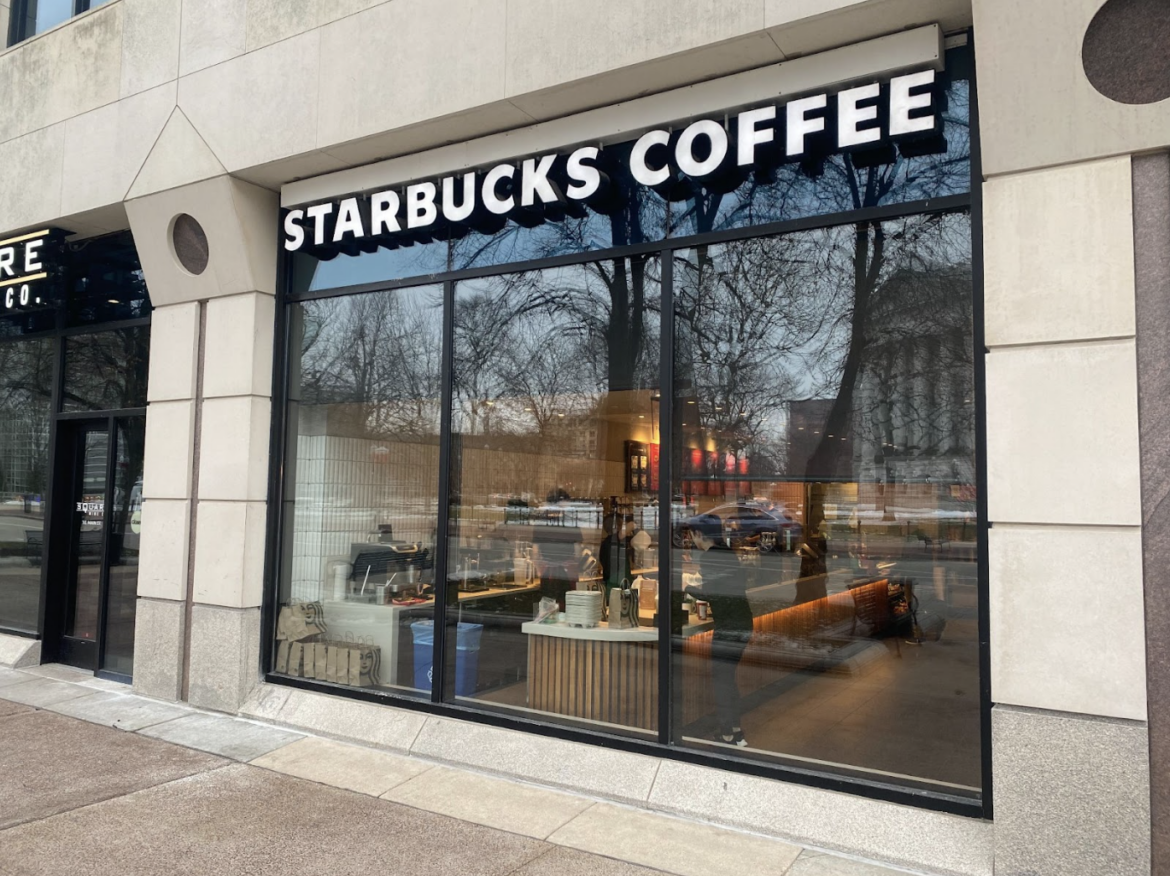After striking on one of the store’s busiest days, Madison’s unionized Starbucks employees continue to demand recognition and fair labor practices
Last fall, Starbucks workers from Madison’s Capitol Square store stood in front of closed doors on what would normally be one of the company’s most profitable days of the year. These unionized baristas joined thousands of other Starbucks workers across the country going on strike on Nov. 17, 2022, Starbucks’ Red Cup Day.
From 5 a.m. to sunset the workers endured Madison’s bitter cold, intent on sending a message to the corporation and community members: their demands mattered and they would be heard.
Starbucks responded to the strike, saying that the company respects the employees’ right to protest and that it will continue to bargain in good faith, according to the Philadelphia Inquirer.
But the union continues to strategize, and the Capitol Square store workers continue their fight for a contract they believe they deserve, making it clear to the company that they're in it for the long run.
Talks of a union started back in summer of 2021 when Starbucks removed some of its pandemic benefits, like increased pay and safety protocols, during an earlier COVID-19 surge. Evan McKenzie, a shift manager at Starbucks in Madison, has been working for the company for five years and was a part of these initial conversations.
“We were in this situation where we were feeling like Starbucks was not treating us like the essential workers that it kept calling us. And a couple of us got together, and we were like, there's this store in Buffalo, New York organizing a union. Could we do that?” McKenzie said.
That is when he and his coworkers created an organizing committee and reached out to Workers United, the larger union representing many of Starbucks’ unionized stores. By early 2022 the committee regularly met and declared to the National Labor Relations Board that they wanted to unionize. In early July, the store voted 15 to 1 in favor of unionization.
The committee demanded better labor practices and that Starbucks would meet and bargain in good faith with the store. The company, legally required to negotiate with its unionized stores, agreed to bargain with a handful of them across the country, including the Capitol Square store.
In late October, Starbucks met with the organizing committee at the Hilton Madison Monona Terrace. But according to McKenzie, Starbucks left just after five minutes, refusing to bargain due to concerns about Zoom recording.
When Starbucks learned that some committee members were joining over Zoom, its lawyers presented a letter to the committee stating that Workers United had changed the agreed-upon meeting into a session that would be virtually broadcasted to individuals not physically present. The company said that it could not be sure who was listening or if the session was being recorded. The letter claimed that the company has a legal right to refuse to be recorded during contract negotiations and thus Starbucks abruptly ended any bargaining.
“We were pretty upset about the fact that Starbucks, even after we had won our union and even after they had a union busted in order for us to get there, were still continuing to not treat our union seriously. So we used pretty much the only power that we workers have, which is to withhold our labor,” McKenzie said.
The strike took place on Red Cup Day, when Starbucks gives out limited-edition reusable cups. For the Capitol store workers, the strike was an opportunity to push back against the company’s refusal to bargain. But it was also a celebration of all the work the committee did to get to that point. Community members and local businesses even joined in, providing food and coffee for the strikers.
Lee Marfyak, another member of the committee who has worked at Starbucks for over five years, believes striking on Red Cup Day was important for the union in gaining momentum.
“We want to show that we are the ones bringing in money for them and without us they can’t make that money, to show how valuable we are to the company. So getting them on a day where they were expecting to make a ton of profit and cutting into that shows the most power. And it was very successful.” Marfyak said.
He says Starbucks is trying to drag out the bargaining process by employing union-busting tactics. According to Marfyak, Starbucks is still withholding credit card tipping at unionized stores which hurts their paychecks at no cost to the corporation. They have also tried changing the store’s hours to open at 4 a.m. on the weekends.
The strike was only the beginning of the union’s efforts to force Starbucks to renegotiate. The committee wants Starbucks to reconsider a bargaining session with virtual attendees, though according to the union, Starbucks’ refusal of Zoom is an excuse to deliberately stall negotiations. McKenzie believes it’s going to take a large financial incentive to bring Starbucks back to the bargaining table. That means more strikes and coordinated public campaigning. The union recently announced “no contracts, no gift cards”, a campaign asking supporters to refrain from buying gift cards during the holiday season.
The committee believes that the Workers United movement relies on both the interconnection of unionized stores and outside community support to succeed. The movement continues to draw the interest of workers at nonunion stores.
Jack Savin has worked at the State Street Starbucks for three years and though it is not unionized, he supports his fellow Starbucks workers' demands for bargaining. Savin even took part in the November strike and says more stores, including the State Street store, will likely unionize.
“Unionizing is needed and a lot of the partners of my store are on the brink of finding someone to headline it. We're working towards it. We're in touch with all the people at the Capitol store, so we're gonna be talking to them soon. We’re going to do it, it's just a matter of finding time,” Savin said.
No matter the challenges and delays, McKenzie says the fight is worth it. He enjoys making coffee, receiving Starbucks’ current benefits and most importantly, being a part of a supportive community of coworkers.
“The opportunity to make a difference in a meaningful way for the people you love seems like a no-brainer to me. We are making a true, positive change. We're creating a community in a way that is just good. We are fighting against the big guys, and we're doing it as a family,” McKenzie said.





